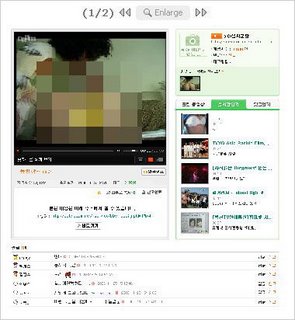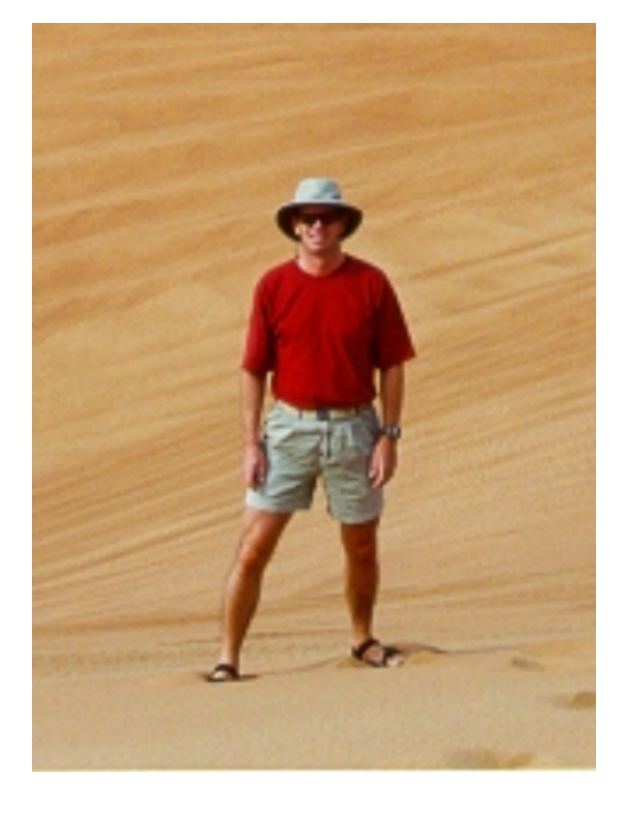 A picture is worth - well, in this case, absolutely nothing. Those of you who are old enough to remember when most news was just text and there were only a few pictures - usually only with the headline story - might be impressed by how vivid the news is now with all of its pictures.
A picture is worth - well, in this case, absolutely nothing. Those of you who are old enough to remember when most news was just text and there were only a few pictures - usually only with the headline story - might be impressed by how vivid the news is now with all of its pictures.However, if you were to look at this blurred picture, could you tell what it was about? I couldn't. Even after I knew what the picture was about, I still couldn't make anything out. This picture accompanies an article about porn online in areas that children can easily access. The story may be important, but the picture adds absolutely nothing to the story. So, my question is, "Why have a picture accompanying the story if the picture is unrecognizable?" Is anyone thinking?
In a further note (a grammar note), one internet user said,
“Because it was the weekend, I was watching video clips for fun with my family -- I was absolutely shocked to see the porn clips,” one lamented. “I never thought such a thing would happen. A lot of children may have watched it; it must never happen again.”
"...must never happen again"??? I think that "should" would be a better term. I do teach the use of modal auxiliaries. I guess this wasn't one of my students. The idea that anyone could really stop this from happening again even if they wanted to is ludicrous.
And, "I never thought such a thing would happen." What turnip truck did this person fall off?


2 comments:
This is not a comment on your current posting, but your slide show.
Earlier this evening I happened across a poem by Li-Young Lee titled "Persimmons." This is an excerpt from the poem (the beginning and the end). The line breaks are occasionally off because of the space restriction of the comment box.
Persimmons
In sixth grade Mrs. Walker
slapped the back of my head
and made me stand in the corner
for not knowing the difference
between persimmon and precision.
How to choose
persimmons. This is precision.
Ripe ones are soft and brown-spotted.
Sniff the bottoms. The sweet one
will be fragrant. How to eat:
put the knife away, lay down the newspaper.
Peel the skin tenderly, not to tear the meat.
Chew on the skin, suck it,
and swallow. Now, eat
the meat of the fruit,
so sweet
all of it, to the heart.
......
Mrs. Walker brought a persimmon to class
and cut it up
so everyone could taste
a Chinese apple. Knowing
it wasn't ripe or sweet, I didn't eat
but watched the other faces.
My mother said every persimmon has a sun
inside, something golden, glowing,
warm as my face.
Once, in the cellar, I found two wrapped in newspaper
forgotten and not yet ripe.
I took them and set them both on my bedroom windowsill,
where each morning a cardinal
sang. The sun, the sun.
Finally understanding
he was going blind,
my father would stay up all one night
waiting for a song, a ghost.
I gave him the persimmons, swelled, heavy as sadness,
and sweet as love.
This year, in the muddy lighting
of my parents' cellar, I rummage, looking
for something I lost.
My father sits on the tired, wooden stairs,
black cane between his knees,
hand over hand, gripping the handle.
He's so happy that I've come home.
I ask how his eyes are, a stupid question.
All gone, he answers.
Under some blankets, I find three scrolls.
I sit beside him and untie
three paintings by my father:
Hibiscus leaf and a white flower.
Two cats preening.
Two persimmons, so full they want to drop from the cloth.
He raises both hands to touch the cloth,
asks, Which is this?
This is persimmons, Father.
Oh, the feel of the wolftail on the silk,
the strength, the tense
precision in the wrist.
I painted them hundreds of times
eyes closed. These I painted blind.
Some things never leave a person:
scent of the hair of one you love,
the texture of persimmons,
in your palm, the ripe weight.
Thanks, that's a lovely poem. Not to be outdone, I found a persimmon haiku (Truth be told, I was looking for a cheeky limerick, but this was a reasonable alternative.)
persimmons ripen
no monkeys nor disciples
at my humble abode
as I eat a persimmon
the bell starts ringing
at Horyuji Temple
having examined
three thousand haiku poems -
two persimmons
by Masaoka Shiki, translated by Susumu Takiguchi
Post a Comment